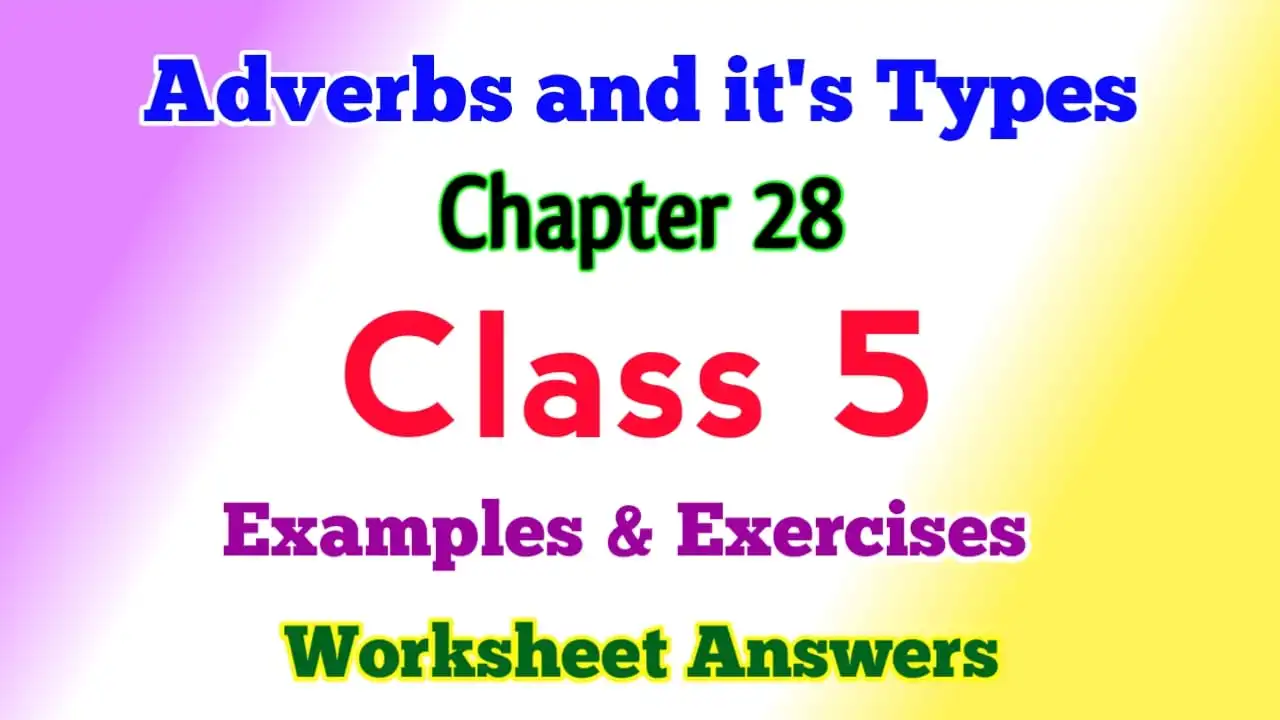Adverbs and Comparison Class 5 English Grammar has been prepared for learning English Grammar of Class 5 under CBSE, ICSE, and Other State boards as Lesson No 28. Class 5 students in their English Grammar learning process will get help from the Adverbs and Comparison Class 5 English Grammar to achieve better speaking and writing skills in English.
This Lesson 28, Adverbs and Comparison Class 5 English Grammar contains – The definition of adverbs, and the Position of Adverbs, Types of Adverbs, with a practice worksheet at the end for better knowledge for class 5.
English Grammar eBook Class 5
Adverbs and Comparison: Class 5 English Grammar
Adverbs are words that tell us more about verbs, adjectives, and other adverbs.
Example:
She walks fast.
Shelly sat quietly. (qualifying the verbs walk and sat)
Sania is very hungry.
Aslam is rather naughty. (qualifying the adjectives hungry and naughty)
This week has passed incredibly slowly.
Esha cleans her desk quite often. (qualifying the adverbs slowly and often)
Kinds of Adverbs
- Adverb of Manner
- Adverb of place
- Adverb of time
- Adverb of frequency
- Adverb of degree
Adverb of Manner
Adverbs that tell us the manner in which an action takes place are called adverbs of manner.
Example:
- The choir sang sweetly.
- The artist painted beautifully.
- Please cross the road carefully.
The highlighted words tell us how an action happens.
Adverb of place
Adverbs that tell us where an action takes place are called adverbs of place.
Example:
- Stay here.
- The puppy follows the lady everywhere.
- Go and sit there.
The highlighted words tell us where the action happens.
Adverb of time
Adverbs that tell us the time when an action takes place are called adverbs of time.
Example:
- The party will begin soon.
- Sahil was absent yesterday.
The highlighted words tell us when an action happens.
Adverb of frequency
Adverbs that tell us the frequency of an action are called adverbs of frequency.
Example:
- This magazine is published fortnightly.
- She is always late for practice.
The highlighted words tell us how often an action happens.
Adverb of degree
Adverbs that tell us the degree or extent to which an action happens are called adverbs of degree. Adverbs of degree can modify verbs, adjectives or other adverbs.
Example:
- The bucket is almost empty.
- The teachers are very helpful.
- He drove quite dangerously.
The highlighted words tell us the extent to which the action happens.
The adverbs of degree answer the question of how much.
Example
- The food is very spicy.
- You are eating so quickly!
- The weather is still too cold.
Position of Adverbs
Adverbs can be put in different positions in a sentence.
1. Adverbs of manner come after the object.
Example:
- He drove the bike carefully.
- She sang the song beautifully.
2. Adverbs of manner come after the verb if the verb has no object.
Example:
- He walked slowly.
- She spoke fluently.
3. Adverbs of time come after the verb or at the beginning of the sentence.
Example:
- I will meet you tomorrow.
- Tomorrow, we will visit the Taj Mahal.
4. Adverbs of place come after the indirect object or the verb.
Example:
- I met him there.
- He sat there.
5. Adverbs of frequency come before the main verb, except the main verb to be.
Example:
- They have never gone to Norway.
- We must always obey our parents.
- They are seldom at work.
6. Adverbs of degree come before the adjective, adverb, or verb they modify.
Example:
- She is very beautiful.
- The little girl danced so beautifully.
- My work is almost finished.
7. Adverbs of frequency like occasionally, sometimes, usually, and frequently can be placed at the beginning of a sentence or at the end.
Example:
- Sometimes I exercise in the morning.
- I exercise in the morning sometimes.
Comparison Adverbs
Like adjectives, adverbs too have three degrees the positive, the comparative, and the superlative.
Example:
- Ravi works hard, (positive)
- Praveen works harder than Ravi, (comparative)
- Syed works the hardest of all, (superlative)
Comparatives and Superlatives of Adverbs.
1. Adverbs with a single syllable usually use er to form the comparative form and est to form their superlative form.
Example:
| Positive | Comparative | Superlative |
| fast | faster | fastest |
| high | higher | highest |
| loud | louder | loudest |
| soon | sooner | soonest |
2. Adverbs that end in ly take more to form the comparative form and most to form their superlative form.
Example:
| Positive | Comparative | Superlative |
| softly | more softly | most softly |
| happily | more happily | most happily |
| swiftly | more swiftly | most swiftly |
| certainly | more certainly | most certainly |
Exception:
| Positive | Comparative | Superlative |
| early | earlier | earliest |
3. The comparative and superlative forms of some adverbs do not follow any specific spelling rule.
Example:
| Positive | Comparative | Superlative |
| well | better | best |
| badly | worse | worst |
| much | more | most |
| little | less | least |
| far | farther further | Farthest (distance) Furthest (additional) |
| late | later | Last (position) |
| late | later | Latest (time) |
Worksheet: Adverbs and Comparison Class 5 English Grammar
A. Pick out the adverbs in these sentences and write them in the appropriate columns. Mention the type of adverb and the verb, adjective, or adverb to which it is added.
1. The newspaper is published daily.
2. I bathe twice daily.
3. The soldiers fought bravely.
4. I have seen this film before.
5. I can’t find the keys anywhere.
6. The teachers arrive at the school early.
7. The stadium was brightly lit.
8. Parents treat their children affectionately.
9. We are leaving for the zoo shortly. Please come home quickly.
10. The customer climbed upstairs and met the owner of the shop.
| Adverbs | Kind of Adverb | Modifying |
| 1. daily | adverb of frequency | is published |
| 2. | ||
| 3. | ||
| 4. | ||
| 5. | ||
| 6. | ||
| 7. | ||
| 8. | ||
| 9. | ||
| 10. |
B. Complete these sentences with suitable adverbs of frequency. You may repeat some of the given adverbs.
regularly, daily, frequently, fortnightly, often, rarely, sometimes.
1. The doctor checks my grandmother’s health _____________ .
2. My family _____________ goes on vacation together.
3. He plays golf _____________.
4. We see him only _____________.
5. General elections are _____________ held in India.
: regularly
6. Many companies pay their taxes _____________ .
7. We sometimes _____________ go shopping on Saturdays.
8. I _____________ visit the orphanage near my home.
9. I visit my grandparents _____________.
10. She takes these tablets _____________
C. Fill in the blanks with very, so or too.
1. Simran is a ____________ naughty child.
2. The colours are ____________ bright for me.
3. The lychees are ____________ sweet.
4. Vinay and Nirupama were ____________ foolish that they gave away their
money to the con man.
5. I am ____________ tired that I might fall asleep on my feet, like a horse!
D. Read the first sentence in each set. Then, fill in a different adverb in the
second sentence.
1. She speaks French fluently.
She speaks French ___________________.
2. You must drive your car carefully.
You must drive your car ___________________.
3. Eat quietly.
Eat ___________________.
4. She wrote the letter clearly.
She wrote the letter ___________________.
5. He came yesterday.
He came ___________________.
early fon time
6. Two cars were parked outside.
Two cars were parked ___________________.
7. She agrees with me
entirely.
She agrees with me ___________________.
8. Stay there by the fireplace.
Stay ___________________ by the fireplace.
9. They sang the song loudly.
They sang the song ___________________.
10. Mahesh always annoys me.
Mahesh ___________________ annoys me.
E. Rewrite these sentences by placing the adverbs in the correct places.
1. He reads a book. (sometimes)
2. I put a little sugar in my milk. (usually)
3. He listens to the radio. (often)
4. Ann gets angry. (never)
5. Sumit and Sumita are hungry. (often)
6. I dream of becoming a pilot. (sometimes)
7. I don’t wear black in summer. (normally)
8. I have seen her before. (never).
9. He talks to us. (hardly ever)
10. The Chairman of the Managing Committee visits our school, (twice a year)
F. Complete each sentence with the correct form of the adverb in the brackets.
1. Vivek walks ______________ (fast) the rest of us.
2. I talk to Purva ______________ (frequently) Aanchal.
3. She greeted everyone ______________ (politely).
4. Pratima speaks French ______________ (fluently) Anjula.
5. Shilpi danced ______________ (gracefully) of all.
6. I did my homework ______________ (fast) my brother.
7. Prerna writes ______________ (beautifully) I do.
8. Mother drives ______________ (carefully),
9. Our team played ______________ (bad) of all.
10. Planes can fly ______________ (high) birds.
11. Can you please write ______________ (clearly)?
12. Prateek had an accident last year. Now, he drives ______________
(slow) before.
13. Fatima is a good cook. She cooks ______________ (good) her mother who was a famous cook in New Zealand.
G. Complete the table.
| Positive | Comparative | Superlative |
| 1. soundly | ||
| 2. | more famously | |
| 3. | most wonderfully | |
| 4. | more sweetly | |
| 5. lazily | ||
| 6. | more violently | |
| 7. | most easily | |
| 8. | more cheerfully | |
| 9. greedily | ||
| 10. | worst | |
| 11. | earlier | |
| 12. | most joyfully | |
| 13. | more swiftly | |
| 14. far | ||
| 15. | more carefully |
Class 5 English Grammar: All Topics & Chapters????:
Chapter 1. Parts of speech
Chapter 2. The sentence and Types
Chapter 3. Subject and Predicate
Chapter 4. Nouns and their Types
Chapter 5. Noun and Number
Chapter 6. Noun and Gender
Chapter 7. Articles
Chapter 8. Pronouns and their Classifications
Chapter 9. Verbs and Types of Verbs
Chapter 10. Regular Verbs Irregular Verbs List
Chapter 11. Subject and Verb Agreement
Chapter 12. Simple Present Tense
Chapter 13. Present Continuous Tense
Chapter 14. Present Perfect Tense
Chapter 15. Present Perfect Continuous Tense
Chapter 16. Simple Past Tense
Chapter 17. Past Continuous Tense
Chapter 18. Past Perfect Tense
Chapter 19. Past Perfect Continuous Tense
Chapter 20. Simple Future Tense
Chapter 21. Future Continuous Tense
Chapter 22. Future Perfect Tense
Chapter 23. Future Perfect Continuous Tense
Chapter 24. Tense Exercises
Chapter 25. Modal Verbs
Chapter 26. Adjectives and their Types
Chapter 27. Degree of Adjectives
Chapter 28. Adverbs and Comparison
Chapter 29. Prepositions and their Uses
Chapter 30. Conjunctions
Chapter 31. Direct and Indirect Speech
Chapter 32. Transformation of Sentences
Chapter 33. Punctuation







